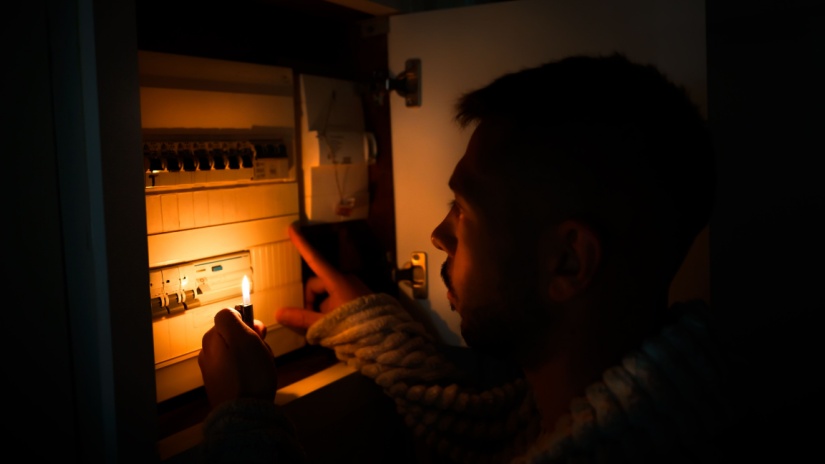Knowledge Centre
What to do in a power outage

Power outages are a common occurrence in Australia, especially during the summer wet season characterised by heavy rain and flash floods. While initial blackouts might seem like a brief novelty, they can quickly become inconvenient and pose risks to your family and pets.
However, there are practical steps you can take to minimise disruption when the power goes out.
For those living in northern Australia, these tips may already be familiar, but it's always helpful to have a quick reminder on how to handle a power outage effectively.
Power outage preparation
Preparing for potential blackouts, especially during the storm season from November to February in Australia, is essential. Here are steps you can take now to get ready for sudden power outages:
Put together an emergency kit
Update your emergency kit with non-perishable food, bottled water, candles, matches, batteries, a portable radio (preferably crank-powered), a first aid kit, and a flashlight (also crank-powered if possible).
Tidy up the yard
Keep trees trimmed to prevent branches from falling on power lines during storms.
Make a plan for medical equipment
If you rely on life-sustaining electrical medical equipment, have a backup plan in case of a power outage. Inform your medical provider about your situation and ensure your equipment is secure.
Schedule an electrical inspection
Schedule an inspection with an electrician to ensure all outlets are safe. Use surge-protected power boards in your home.
Gather emergency numbers
Compile a list of emergency contacts including your local SES, energy distributor, and power provider.
Keep the refrigerator closed
Try to avoid opening up the freezer and fridge doors. If you have a thermometer handy, you can use it to check if food in the fridge has spoiled during a blackout.
Get prepared
Charge your phone fully when severe weather warnings are issued. Secure outdoor furniture and consider moving your car under cover.
Battery powered lighting will help
Leave a single light switched on during a blackout to signal when power has been restored.
These proactive measures can help you stay safe and comfortable during unexpected power outages.
When the power goes out
If you experience a sudden blackout, the first priority is to determine its cause safely. Is it weather-related, a tripped safety switch, or a planned outage you missed notifications about?
Once you've identified the reason for the blackout, take steps to ensure everyone's safety:
- For planned outages, wait until power is restored.
- If caused by weather, consider these actions:
- Contact your energy provider for updates, using a portable radio if needed.
- Check for fallen power lines and notify your energy distributor if any are found. Avoid the area and call emergency services (000) if there's a life-threatening situation.
- Minimise opening the fridge to prevent food spoilage.
- Ensure access to necessary medical supplies, especially if you rely on electrical medical equipment.
- Unplug sensitive electronic devices to protect them from potential power surges.
- Activate power-saving mode on your smartphone to conserve battery.
- Check on neighbours or nearby acquaintances to offer assistance if needed.
- During an extended outage, consider engaging in activities like reading by candlelight, playing games with family or roommates, or simply taking time to relax.
Once the power is back on
After the storm passes and your home regains power, it’s important to assess any potential damage. Here are some key things to check:
Go and check your food
Use the thermometer we mentioned earlier to check if any food in your fridge spoiled during the blackout. Discard any perishables that have been above 4°C for more than two hours.
Talk to a pharmacy
Contact a pharmacist to verify the effectiveness of any medications that require refrigeration after the blackout.
Reset your appliances
Safely plug in and restart all appliances and electronic devices now that power has been restored.
Reset the clocks
Reset digital clocks on appliances like ovens and microwaves to the correct time to avoid missing important schedules.
Replenish the emergency kit
If you used items from your emergency kit during the blackout, replenish them to ensure readiness for future emergencies.
Drive carefully
After a severe weather-related blackout, exercise caution while travelling due to potential debris and road damage. Emergency crews may still be clearing roads in the days following the event.
Get reconnected with Compare Energy
Experiencing a power outage can disrupt your routine and make you realise how dependent you are on electricity.
If you haven't reviewed your energy plan recently, it's a good opportunity to do so. If you're looking to switch to a reliable energy provider, contact Compare Energy at 1300 790 106 today. Let us help you find the best energy solution for your needs.

